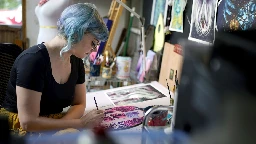Visual artists fight back against AI companies for repurposing their work
Visual artists fight back against AI companies for repurposing their work
apnews.com
Visual artists fight back against AI companies for repurposing their work
Three visual artists are suing artificial intelligence image-generators to protect their copyrights and careers.
